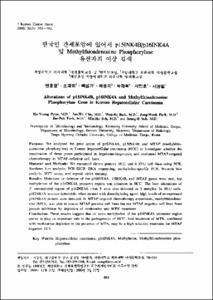한국인 간세포암에 있어서 p15INK4B/p16INK4A 및 Methylthioadenosine Phosphorylase 유전자의 이상 검색
- Keimyung Author(s)
- Baek, Won Ki; Suh, Min Ho; Suh, Seong Il; Park, Jong Wook
- Journal Title
- 대한암학회지
- Issued Date
- 2000
- Volume
- 32
- Issue
- 3
- Abstract
- Purpose: We analyzed the gene status of p16INK4A, p15INK4B and MTAP (methylthioadenosine phophorylase) in Korean hepatocellular carcinoma (HCC) to investigate whether the inactivation of these genes participated in hepatocarcinogenesis, and evaluated MTAP-targeted chemotherapy in MTAP-deficient cell lines.
Materia] and Methods: We examined eleven primary HCC and 8 SNU cell lines using PGR, Southern blot analysis, PCR-SSCP,DNA sequencing, methylation-specific PGR, Western blot analysis, MTT assay, and crystal violet staining.
Results: Mutations or deletion of the p16INK4A, 15INK4B, and MTAP genes were rare, but methylation of the pl6INK4A promoter region was common in HCC. The base alterations of 3’ untranslated region of pl6INK4A exon 3 were also detected in 3 samples. In SNU cells, pl6INK4A was not detectable, when treated with demethylating agent, high levels of re-expressed pl6INK4A protein were detected. In MTAP-targeted chemotherapy experiment, methylthioadenosine (MTA) was able to rescue MTAP positive cell lines but not MTAP negative cell lines from growth inhibition by depletion of methionine and MTX treatment.
Conclusion: These results suggest that de novo methylation of the pl6INK4A promoter region seems to play an important role in the pathogenesis of HCC. And treatment of MTX, combined with methionine depletion in the presence of MTA, may be a high selective treatment for MTAP negative HCC.
- Alternative Title
- Alterations of p15INK4B, p16INK4A and Methylthioadenosine Phosphorylase Gene in Korean Hepatocellular Carcinoma
- Publisher
- School of Medicine
- Citation
- 변호영 et al. (2000). 한국인 간세포암에 있어서 p15INK4B/p16INK4A 및 Methylthioadenosine Phosphorylase 유전자의 이상 검색. 대한암학회지, 32(3), 553–562.
- Type
- Article
- ISSN
- 0496-6872
- Appears in Collections:
- 1. School of Medicine (의과대학) > Dept. of Immunology (면역학)
1. School of Medicine (의과대학) > Dept. of Microbiology (미생물학)
- 파일 목록
-
-
Download
 oak-bbb-02785.pdf
기타 데이터 / 892.18 kB / Adobe PDF
oak-bbb-02785.pdf
기타 데이터 / 892.18 kB / Adobe PDF
-
Items in Repository are protected by copyright, with all rights reserved, unless otherwise indicated.